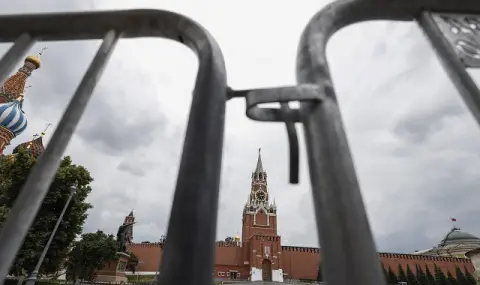After the aggression against Ukraine, Russia waged an even more active hybrid war through espionage, sabotage, liquidation of enemies, interference in elections and disinformation. The phenomenon is not new, but the methods are becoming more sophisticated.
A cargo plane for German courier service provider DHL crashed in Lithuania, two undersea data cables were damaged in the Baltic Sea, and a pro-Russian right-wing extremist surprisingly reached the decisive second round of Romania's presidential election. Three events of recent days that make us think.
Although nothing has yet been conclusively proven, a number of Western politicians and intelligence agencies suspect the same driving force behind all of these incidents: Russia. The dangers posed by so-called hybrid warfare led by the Kremlin are not new. But experts warn that they have increased dramatically since Russia invaded Ukraine in 2022.
„Hybrid War“ contains tools for espionage, sabotage, cyber-attacks, election interference, propaganda or disinformation campaigns aimed at weakening and destabilizing the adversary from within. Experts warn that in recent years, Russia has been constantly expanding its arsenal of options for waging hybrid warfare.
Espionage
After Russia's invasion of Ukraine, European countries expelled around 500 Russian diplomats. The British secret service MI5 categorized at least 400 of them as spies. Many Russian embassies and consulates general are said to be equipped with state-of-the-art communications and espionage technology.
This cannot be proven indisputably - after all, the buildings are considered inviolable Russian territory and enjoy the status of diplomatic protection. And the Dutch secret services have warned that Russia supplies spies with false documents and embeds them in Western institutions, creating alibis of businessmen for them.
There are also regular reports accusing Russia of espionage. We know, for example, about intercepted telephone conversations of Bundeswehr officers dedicated to the Taurus missile defense system. There are suspicions that Russian drones fly over European air bases and industrial zones on special orders. The same applies to ships that criss-cross the seas of Northern Europe to map critical infrastructure on the seabed for possible sabotage.
Sabotage
A Chinese cargo ship operated by a Russian captain is said to have damaged two submarine cables using an anchor dragged along the seabed. There was a similar incident in October 2023.
Last month, a warehouse in London was set on fire, in which supplies for Ukraine were stored. In July, a shipment that was supposed to be shipped by air caught fire at DHL's logistics center in Leipzig. Russian sabotage is suspected in these and many other cases. However, nothing has been conclusively proven so far.
However, European intelligence agencies warn that the number of acts of sabotage and arson in the EU and the UK has risen dramatically in the past year.
Cyber attacks
The Federal Office for Information Technology Security also warns that the threat level in cyberspace is “higher than ever”. Espionage and sabotage thrive online. “Russia-linked groups have been particularly active in Germany in cyberespionage and financial ransom attacks. After the start of Russia's war of aggression against Ukraine, the spectrum of threats has expanded further”, the service says.
For example, the number of DDoS attacks “by pro-Russian hackers” has increased sharply. In them, institutions' sites and servers are flooded with malicious traffic, causing them to fail due to overload. The number of hacker attacks with the aim of penetrating the protected networks of companies or institutions is also increasing.
Disinformation and propaganda
Another major area of activity in hybrid warfare is trying to influence public opinion in certain countries. This includes spreading false information and pro-Russian or anti-Ukrainian narratives, for example through the so-called troll factories on social media or through Russian media.
At the beginning of 2024. the German Foreign Ministry revealed the so-called “doppelgänger“ campaign: 50,000 fake user accounts spread fake messages and pro-Russian opinions on social networks, linking to fake websites, some of which deceptively resembled the sites of authoritative media - except that they were spreading pro-Russian fake news.< /p>
Interference in elections and political processes
One of the main goals of these disinformation campaigns is to undermine support for Ukraine among the population. Another goal is to undermine political stability in the target (democratic) state by strengthening far-right parties and their candidates. This is done, for example, through financial support.
In April, the Czech secret services denounced the propaganda website "Voice of Europe", which was allegedly financed by Moscow and that bribes were paid to various European parliamentarians through it.
Western intelligence services accuse Russia of directly or indirectly influencing the elections in dozens of countries - in Europe, North and South America. For example, it is claimed that the Russian propaganda channel RT has produced videos on very controversial topics, such as aid to Ukraine, migration and the economy, for the needs of the US presidential election campaign. These clips were distributed by right-wing American bloggers.
Hacker attacks are also part of the repertoire: information of politicians or parties is deliberately hacked and confidential documents are published, sometimes even mixed with other fake documents and immediately before elections. We saw this in the US election in 2016 or during the French presidential election campaign in 2017.
Eliminate enemies
In theory, attacks on individuals also fall within the scope of hybrid warfare. Putin has no qualms about going after his enemies even abroad, as was the case with the former Chechen commander killed in Berlin and the attacks on Alexander Litvinenko and Sergei Skripal in the UK. So far, Russian citizens have mostly been the victims of such attacks. In July 2024 however, it became known that Russia had planned an attempt on the head of “Rheinmetal“ Armin Papperger. This German company manufactures the “Leopard“-2 tanks for Ukraine.
